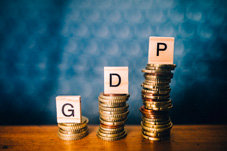
Georgia’s economy grows by 2.2% in February
By Natalia Kochiashvili
Thursday, April 2
The National Statistics Office of Georgia (Geostat) has released a report on economic growth in February. According to preliminary estimates, Georgian economy grew by only 2.2% in February compared to the same period last year. The average real growth in January-February was 3.7 %. It should be noted that GDP growth in January was 5.1%.
This fact indicates that the crisis situation in Georgia started in February. It is likely that March and April will be much harder for the economy. This is the period when the tourist season begins in Georgia, with revenues from the aforementioned and related areas being one of the most important sources of revenue for Georgian economy, and therefore the bans in effect in March reduce the likelihood of such revenues. It is expected that the volatile situation in the foreign exchange market will also reduce real estate activity. Growth is expected in the wholesale and retail sectors.
Gogita Todradze, the head of the Geostat, spoke about the areas in which growth was recorded in February compared to the same period of the previous year. There was an increase in the following activities: wholesale and retail; repair, information and communication of motor vehicles and motorcycles, real estate activities, accommodation and food supply activities.
Todradze says the growth in the financial and insurance sectors is attributed to the increase in banks' interest income. There was also an increase in trade, driven by the increase in sales of cars and their parts, on the one hand, and the re-export of light cars by 60% on the other. According to him, retail sales have increased in the cases of food, beverages and pharmaceuticals.
“The growth trend was also seen in the hotel and restaurant sector, due to tourism. As you know, in February the number of one-day visits decreased by about 8.6%, but the number of tourist visits increased by 4% in February 2020.” - he said, adding that for the real estate sector, the growth was driven by the increase in the volume of turnover of companies related to the purchase and sale of residential buildings.
Decline was recorded in the processing industry, construction, transport and warehousing sectors of the economy.
According to Geostat, the turnover of VAT-paying enterprises amounted to GEL 6.254 billion in February, up 10.5% year-on-year. However, the VAT turnover rate was much higher in January and increased by 14% annually.
Importantly, foreign trade turnover increased by 6%. The growth rate is characterized by both exports and imports.
As for the state budget figures, there is a sharp decrease in budget revenues. The rate of February fell by more than 100 million GEL compared to the same indicator of January (January - 909 million GEL, February 792 million GEL). It is likely that this trend will continue in March and April.
TBC Capital reported on the growth rate of lending in the banking sector. In February 2020, loans in the banking sector grew by 17% annually to GEL 30.9 billion.
The total amount of loans denominated in GEL increased by 25.2% year-on-year to GEL 14.2 billion, the total amount of foreign currency denominated loans equaled GEL 16.6 billion, increasing by 10.8% annually.
TBC Capital Review read that during February, the spread between interest rates on GEL and foreign currency loans declined compared to January 2020, as interest rates on GEL loans decreased by 0.2 pp (to 16.3%), and 0.1 pp in foreign currency loans. The volume of loans to households amounted to GEL 15.8 billion (+10.95% y/y) by the end of February 2020 and accounted for 51.3% of total loans, while the total amount of loans to legal entities reached the equivalent of GEL 15.0 billion (+ 24.36% y/y).


